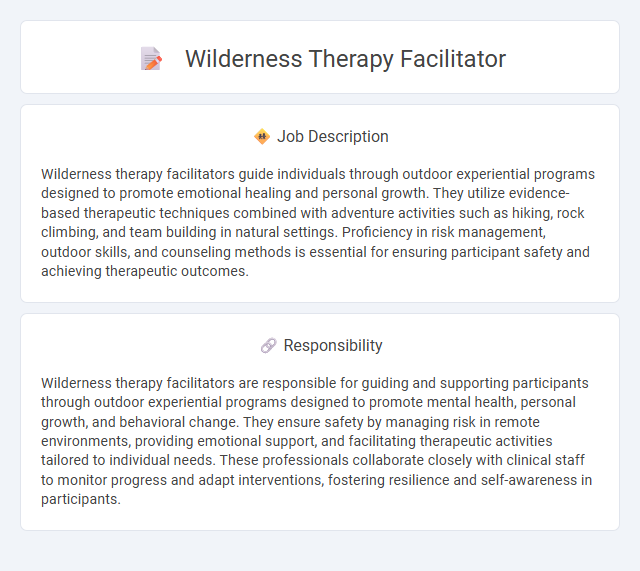
Wilderness therapy facilitators guide individuals through outdoor experiential programs designed to promote emotional healing and personal growth. They utilize evidence-based therapeutic techniques combined with adventure activities such as hiking, rock climbing, and team building in natural settings. Proficiency in risk management, outdoor skills, and counseling methods is essential for ensuring participant safety and achieving therapeutic outcomes.
Individuals with strong emotional resilience and a passion for outdoor work are likely suitable for a Wilderness Therapy Facilitator role. People who thrive in physically demanding environments and possess excellent interpersonal skills may be well-suited to support at-risk clients effectively. Those who struggle with high-stress situations or lack adaptability might find this job challenging.
Qualification
Wilderness therapy facilitators must possess strong backgrounds in outdoor education, psychology, or social work, often requiring certifications in wilderness first aid and CPR. Experience in therapeutic techniques and group facilitation, along with a deep understanding of adolescent development and behavioral health, is essential for effectively guiding clients through wilderness therapy programs. Advanced qualifications may include licensure as a mental health professional and specialized training in wilderness therapy methodologies.
Responsibility
Wilderness therapy facilitators are responsible for guiding and supporting participants through outdoor experiential programs designed to promote mental health, personal growth, and behavioral change. They ensure safety by managing risk in remote environments, providing emotional support, and facilitating therapeutic activities tailored to individual needs. These professionals collaborate closely with clinical staff to monitor progress and adapt interventions, fostering resilience and self-awareness in participants.
Benefit
Wilderness therapy facilitator roles likely offer significant benefits such as fostering personal growth and emotional healing through outdoor experiential learning. The position may also provide a unique chance to work closely with individuals struggling with behavioral or emotional challenges, enhancing interpersonal and crisis management skills. This job could appeal to those seeking meaningful work that combines nature, therapy, and leadership development.
Challenge
Wilderness therapy facilitators likely face significant challenges in managing diverse group dynamics while ensuring safety in unpredictable outdoor environments. They probably need to adapt quickly to changing weather and terrain conditions, requiring strong problem-solving skills and emotional resilience. The role might also involve guiding participants through intense emotional and physical experiences, which could demand patience and effective communication.
Career Advancement
Wilderness therapy facilitators gain valuable skills in outdoor leadership, counseling techniques, and crisis management, paving the way for career advancement in mental health and adventure therapy fields. Experience in this role often leads to supervisory or program development positions within therapeutic outdoor education organizations. Certifications such as Wilderness First Responder and Licensed Clinical Professional Counselor significantly enhance opportunities for professional growth.
 kuljobs.com
kuljobs.com